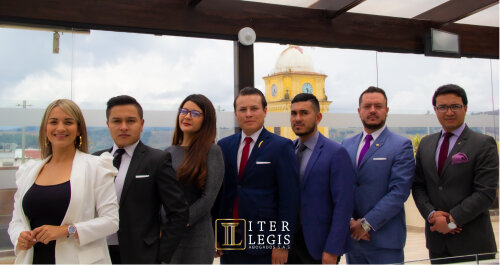Best Military Law Lawyers in Tunja
Share your needs with us, get contacted by law firms.
Free. Takes 2 min.
List of the best lawyers in Tunja, Colombia
About Military Law in Tunja, Colombia
Military Law in Tunja, Colombia refers to the regulations, statutes, and legal principles governing the conduct of members of the military and other related institutions in the region. This specialized branch of law covers areas such as military discipline, the rights and duties of service members, military criminal offenses, and administrative procedures within the Colombian Armed Forces. Tunja, as the capital of the Boyacá Department and home to significant military installations, has a local judiciary infrastructure responsible for handling cases involving military personnel.
Why You May Need a Lawyer
There are multiple circumstances under which individuals in Tunja may require the assistance of a lawyer experienced in military law. Common situations include:
- Facing disciplinary proceedings or court-martial for alleged violations of military codes.
- Understanding legal obligations or rights while serving in the military or during conscription.
- Representing military personnel accused of criminal offenses under military jurisdiction.
- Challenging administrative decisions such as discharge, demotion, or transfer.
- Addressing concerns about military pensions, benefits, or injury claims.
- Advising on how military service affects family law matters, such as custody or inheritance.
- Protecting human rights and ensuring due process for service members.
Local Laws Overview
Military Law in Colombia is primarily governed by the Military Criminal Code (Código Penal Militar), Law 1407 of 2010, which sets out offenses, procedures, and sanctions unique to the Armed Forces. Cases involving military personnel may be tried by specialized military courts, which operate separately from the civilian judiciary.
Key aspects relevant to Military Law in Tunja include:
- Jurisdiction - military courts handle offenses directly related to military service or discipline.
- Conscription requirements for citizens - including medical, academic, or family grounds for exemption.
- Administrative procedures for promotions, resignations, and retirements within the military.
- Protection of rights and guarantees for military personnel as set forth by the Colombian Constitution and international treaties ratified by Colombia.
- Relationship between military and civilian justice systems, particularly for crimes that may overlap their jurisdiction.
Frequently Asked Questions
What is Military Law and how does it differ from civilian law in Colombia?
Military Law specifically governs members of the Colombian Armed Forces and differs from civilian law mainly in its focus on discipline, offenses, and procedures that are unique to military life. Some crimes, such as insubordination or desertion, are only applicable to military personnel and are handled by military courts.
Who falls under Military Law jurisdiction in Tunja?
All active members of the Armed Forces, including the Army, Navy, and Air Force, as well as certain police activities related to national defense, fall under Military Law jurisdiction in Tunja.
Can a military case be transferred to a civilian court?
Yes, in certain situations such as when the alleged crime is not strictly related to military service or involves civilians, the case may be transferred to civil jurisdiction following procedures set by Colombian law.
What are the main rights of military personnel under investigation?
Military personnel are entitled to legal representation, the right to be informed of charges, the presumption of innocence, access to evidence, and the right to appeal any decisions.
How do I appeal a disciplinary or criminal sanction from a military court?
Decisions by military disciplinary bodies or courts can be appealed through the established military justice system. In some cases, appeals may ultimately reach Colombia's higher judicial or constitutional courts.
What is the process for conscription or voluntary enlistment?
Conscription is mandatory for Colombian citizens, with certain exemptions allowed. The process involves medical and psychological evaluations and issuing of a military passbook ("libreta militar"). Voluntary enlistment follows a similar procedure.
Can women serve in the Colombian military?
Yes, women can serve in the military, either as volunteers or through professional career tracks, and are subject to the same Military Law as men.
What legal remedies exist if I am unfairly discharged or demoted?
You may file an administrative appeal within the military, and if unsatisfied, further pursue the case before administrative courts to contest unfair treatment, with legal assistance recommended.
How do military legal proceedings affect civilian status or rights?
Legal proceedings in the military justice system typically do not affect civilian rights unless a conviction leads to a loss of status or rights, such as voting or holding public office, under specific circumstances.
Where can I find help if my human rights are violated during military service?
You may approach Colombia's Defensoría del Pueblo (Ombudsman’s Office), Human Rights offices, or seek support from human rights organizations specializing in military personnel’s rights.
Additional Resources
If you need information or assistance in military law matters in Tunja, consider these resources:
- Juzgado de Instrucción Penal Militar de Tunja - Local military courts handling military criminal and disciplinary matters.
- Ministerio de Defensa Nacional - The central administrative authority for defense and military personnel affairs.
- Defensoría del Pueblo - For protection and promotion of human rights, including those of military personnel.
- Colombian Bar Associations - Some organizations offer specialized legal services for military law issues.
- Veterans and Military Personnel Support Groups - For advice and community support regarding military service rights and obligations.
Next Steps
If you need legal assistance in military law in Tunja, Colombia:
- Gather all relevant documents such as service records, disciplinary notices, or court summons.
- Contact a legal professional specializing in military law for a consultation. You may find lists of accredited lawyers at local bar associations or through the judiciary.
- If facing urgent disciplinary action, request legal representation as soon as possible to protect your rights during investigations and proceedings.
- Consider reaching out to governmental bodies or advocacy groups if your case involves human rights issues or administrative appeals.
- Follow procedural timelines for appeals or responses, as delays can affect your chances of success.
Acting promptly and seeking advice from professionals familiar with military law will ensure your case is handled effectively and your rights are protected.
Lawzana helps you find the best lawyers and law firms in Tunja through a curated and pre-screened list of qualified legal professionals. Our platform offers rankings and detailed profiles of attorneys and law firms, allowing you to compare based on practice areas, including Military Law, experience, and client feedback.
Each profile includes a description of the firm's areas of practice, client reviews, team members and partners, year of establishment, spoken languages, office locations, contact information, social media presence, and any published articles or resources. Most firms on our platform speak English and are experienced in both local and international legal matters.
Get a quote from top-rated law firms in Tunja, Colombia — quickly, securely, and without unnecessary hassle.
Disclaimer:
The information provided on this page is for general informational purposes only and does not constitute legal advice. While we strive to ensure the accuracy and relevance of the content, legal information may change over time, and interpretations of the law can vary. You should always consult with a qualified legal professional for advice specific to your situation.
We disclaim all liability for actions taken or not taken based on the content of this page. If you believe any information is incorrect or outdated, please contact us, and we will review and update it where appropriate.









